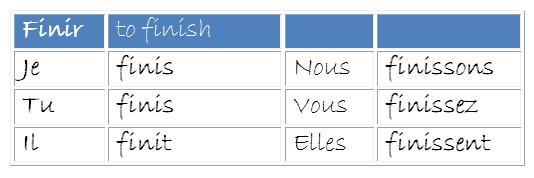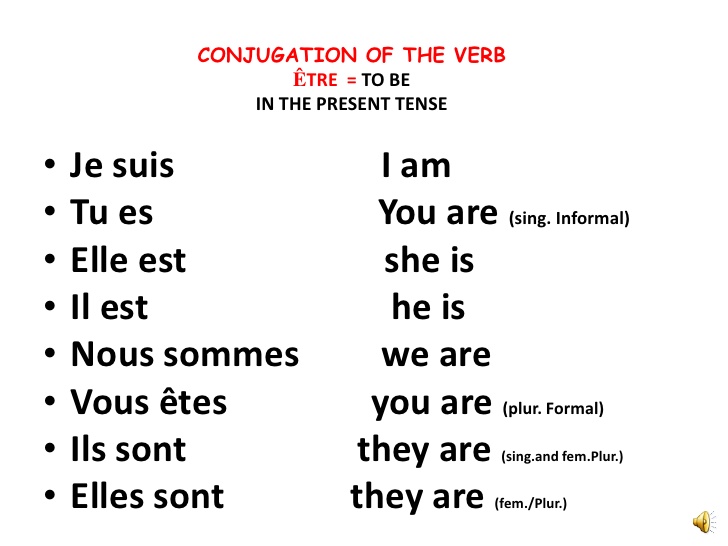How to Conjugate Regular French Verbs
To simplify things, French has classified regular verbs into three types, based on the ending of their infinitives. Think of all the things you can possibly do in one day. That’s also a lot of verbs to conjugate.
- The largest group is the verbs whose infinitive ends in -er (the -erverbs), like parler (to speak).
- The second largest group is made up of the verbs whose infinitive ends in-ir(the -ir verbs), like finir (to finish).
- The third group consists of the -reending verbs (the -re verbs), likevendre (to sell).
Each type follows a pattern of conjugation for every tense.
Think of the infinitive as the family name of a verb: A family shares a common last name, but each individual has his or her own characteristics, right. Use the infinitive to recognize the verb type (
-er, -ir, or -re) that allows you to find its conjugation pattern and also look up the verb in the dictionary.
 How to conjugate a regular -er verb
How to conjugate a regular -er verb
More than 80 percent of French verbs are
-er verbs. It’s great for you, because after you know their pattern of conjugation in the present tense, you can pretty much conjugate 80 percent of French verbs. Doesn’t that sound great?
To conjugate a regular
-er verb, drop the
-er of the infinitive to get the stem. Then add the six present tense endings specific to
-erverbs:
-e, -es, -e, -ons, -ez, -ent, and you’re done. Easy! The following table conjugates a regular
-er verb:
aimer (
to like).
| j’aime |
nous aimons |
| tu aimes |
vous aimez |
| il/elle/on aime |
ils/elles aiment |
 Aller
Aller (
to go)
is a very common verb, and it looks like a regular
-er verb. However, it is not.
Aller is a very irregular verb.
How to conjugate a regular -ir verb
The
-ir verb group is the second most common verb type. To form the present tense of a regular
-ir verb, drop the
-ir of the infinitive to get the stem for the present tense conjugation. Then add the present tense endings specific to
-ir verbs:
-is, -is, -it, -issons, -issez, -issent. The following table conjugates a regular
-ir verb:
finir (
to finish).
| je finis |
nous finissons |
| tu finis |
vous finissez |
| il/elle/on finit |
ils/elles finissent |
Not all
-ir verbs follow this pattern. So just use a little more caution when dealing with
-ir ending verbs.

 How to conjugate a regular -re verb
How to conjugate a regular -re verb
Verbs that end in
-re are the third conjugation type. To form the present tense of an
-re verb, drop the
-re of the infinitive, like you do for
-er and
-ir verbs. When you do that, you’re left with the stem for the conjugation of the present tense, and you can add the present tense endings specific to
-re verbs:
-s, -s,nothing, -ons, -ez, -ent.The following table conjugates a regular
-re verb:
vendre (
to sell).
| je vends |
nous vendons |
| tu vends |
vous vendez |
| il/elle/on vend |
ils/elles vendent |

Conjugation of Être, Avoir, Aller, and Faire verbs:
How to Conjugate the Irregular French Verbs Être, Avoir, Aller, and Faire ?
In French and in English, the verbs
être (
to be),
avoir (
to have),
aller (
to go), and
faire (
to do) are probably the most used verbs of our repertoire, which is also why they have become so twisted.
The four tables that follow give you the present tense conjugations of these verbs.
Être Verb:
 Avoir Verb:
Avoir Verb:

For pronounciation, be very careful with
ils sont (
they are)
and
ils ont (
they have),
because they have pretty similar sounds. The difference is between the soft sound of
ils sont and the
z sound created by the
liaison (the verbal link between the final
-s and the following vowel) in
ils ont.
Aller Verb:
 Faire Verb:
Faire Verb:

]]>
 How to conjugate a regular -er verb
More than 80 percent of French verbs are -er verbs. It’s great for you, because after you know their pattern of conjugation in the present tense, you can pretty much conjugate 80 percent of French verbs. Doesn’t that sound great?
To conjugate a regular -er verb, drop the -er of the infinitive to get the stem. Then add the six present tense endings specific to -erverbs: -e, -es, -e, -ons, -ez, -ent, and you’re done. Easy! The following table conjugates a regular -er verb: aimer (to like).
How to conjugate a regular -er verb
More than 80 percent of French verbs are -er verbs. It’s great for you, because after you know their pattern of conjugation in the present tense, you can pretty much conjugate 80 percent of French verbs. Doesn’t that sound great?
To conjugate a regular -er verb, drop the -er of the infinitive to get the stem. Then add the six present tense endings specific to -erverbs: -e, -es, -e, -ons, -ez, -ent, and you’re done. Easy! The following table conjugates a regular -er verb: aimer (to like).
 Aller (to go) is a very common verb, and it looks like a regular -er verb. However, it is not. Aller is a very irregular verb.
How to conjugate a regular -ir verb
The -ir verb group is the second most common verb type. To form the present tense of a regular -ir verb, drop the -ir of the infinitive to get the stem for the present tense conjugation. Then add the present tense endings specific to -ir verbs: -is, -is, -it, -issons, -issez, -issent. The following table conjugates a regular -ir verb: finir (to finish).
Aller (to go) is a very common verb, and it looks like a regular -er verb. However, it is not. Aller is a very irregular verb.
How to conjugate a regular -ir verb
The -ir verb group is the second most common verb type. To form the present tense of a regular -ir verb, drop the -ir of the infinitive to get the stem for the present tense conjugation. Then add the present tense endings specific to -ir verbs: -is, -is, -it, -issons, -issez, -issent. The following table conjugates a regular -ir verb: finir (to finish).

 How to conjugate a regular -re verb
Verbs that end in -re are the third conjugation type. To form the present tense of an -re verb, drop the -re of the infinitive, like you do for -er and -ir verbs. When you do that, you’re left with the stem for the conjugation of the present tense, and you can add the present tense endings specific to -re verbs: -s, -s,nothing, -ons, -ez, -ent.The following table conjugates a regular -re verb: vendre (to sell).
How to conjugate a regular -re verb
Verbs that end in -re are the third conjugation type. To form the present tense of an -re verb, drop the -re of the infinitive, like you do for -er and -ir verbs. When you do that, you’re left with the stem for the conjugation of the present tense, and you can add the present tense endings specific to -re verbs: -s, -s,nothing, -ons, -ez, -ent.The following table conjugates a regular -re verb: vendre (to sell).
 Avoir Verb:
Avoir Verb:
 For pronounciation, be very careful with ils sont (they are) and ils ont (they have), because they have pretty similar sounds. The difference is between the soft sound of ils sont and the z sound created by the liaison (the verbal link between the final -s and the following vowel) in ils ont.
Aller Verb:
For pronounciation, be very careful with ils sont (they are) and ils ont (they have), because they have pretty similar sounds. The difference is between the soft sound of ils sont and the z sound created by the liaison (the verbal link between the final -s and the following vowel) in ils ont.
Aller Verb:
 Faire Verb:
Faire Verb:
 ]]>
]]>

